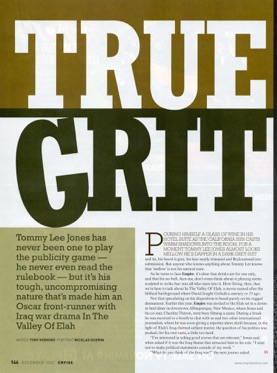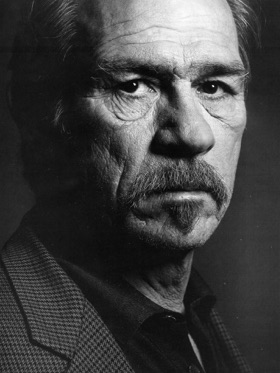Pouring himself a glass of wine in his hotel suite as the California sun casts warm shadows into the room, for a moment Tommy Lee Jones almost looks mellow. He’s dapper in a dark grey suit and tie, his beard is grey, his hair is neatly trimmed and brylcreemed into submission. But anyone who knows anything about Tommy Lee knows that ‘mellow’ is not his natural state.
As he turns to face your Empire correspondent, it’s clear that drinks are for one only, and that his no bull, dare me, don’t even think about it fizog is sculpted to strike fear into all that stare into it. How fitting then that we’re here to talk about In The Valley of Elah, the biblical battleground where David fought Goliath a century or 33 ago.
Not that speculating on his disposition is based purely on his rugged demeanour. Earlier this year Empire was invited to the Elah set in a down at heel diner in downtown Albuquerque, New Mexico, where Jones and his co-star, Charlize Theron, were busy filming a scene. During a break he was escorted to a booth where he was soon giving a reporter short shrift because, in light of Elah’s Iraq-themed subject matter, the question of his personal politics was pushed a little too hard.
“Is this the third time I have to answer the question?” he snapped. “OK... I'm not going to discuss my personal political thoughts and feelings and I'm not going to tell you why.”
That kind of response delivered by that kind of face was enough to send the questioner into retreat, and Tommy Lee back to the catering tent. However, outside of the business of schmoozing, his attitude and face have served him well, a look that when combined with an innate ability to convey so much by doing so little has kept him in constant employ since debuting in a small part in 1970’s Love Story.
Since then he’s proved his diversity with lighter fare like Men In Black and Space Cowboys and made some missteps with the likes of Under Siege, Volcano and Batman Forever. However, it’s his intense dramatic turns that have made his mark so indelible. In The Fugitive he picked up a Best Supporting Actor Oscar for his part as the caustic Fed on Harrison Ford’s tail, and roles in Natural Born Killers, Heaven and Earth, Coal Miner’s Daughter, Rules of Engagement and JFK have all helped to make him the go-to guy for a director looking to add a little gravitas to their project.
Now there’s Oscar buzz over two January releases starring the 62-year-old. The Coen Brothers cast him as a disillusioned sheriff in the thriller No Country for Old Men, an adaptation of Cormac McCarthy’s violent novel about a bad drug deal in the deserts of Texas. Meanwhile Paul Haggis knew he was the right man to convey the stoic pain of a former officer searching for his son, missing after returning from the Iraq war, in In The Valley of Elah. Both roles could help secure Jones’ position as one of America’s greatest living actors.
Which is all just terrific should you merely be enjoying his powerful performances from the safety of a multiplex aisle seat: face-to-face is a different story. Even Paul Haggis, directing Jones on his sophomore project, admits that though more than happy with his performance, the actor doesn’t exactly make it a smooth ride.
“He's a formidable person,” he tells Empire. “I would never describe Tommy Lee as an easy man, and he wouldn't describe himself as such. But he's someone that if you gain his respect he's excellent to work with.”
Charlize Theron, Jones’ Elah co-star, also knew a little of his reputation and went so far as to call his The Good Old Boys co-star, Frances McDormund, for a little advice.
“I was very intimidated and I owe Frances a lot,” she says. “I asked her how it was working with him, and she said 'Just give him a big hug every time you see him and he just drops his guard', and I did that the first time I saw him. From that moment on he just took me under his wing.”
Somehow it seems unlikely that Mr Jones will react quite so enthusiastically to your Empire reporter going in for a nuzzle, so instead we keep things businesslike, which is just the way Tommy Lee likes it.
“I’m very interested in business,” he says, taking a gentle sip from a glass of white. “The business of being a director and a writer and a producer.”
Just two years ago Jones followed his directorial debut, 95’s The Good Old Boys, with The Three Burials of Melquiades Estrada, Guillermo Arriaga’s (Babel) perspective-shifting story of a ranch hand’s attempt to bury his best friend in his hometown of Mexico. The film also starred Jones and picked up two awards at Cannes, adding yet another string to his already impressive bow.
“I really like directing movies,” he says. “I own the motion picture rights to Earnest Hemingway's last book, Islands in the Stream. We've written the screenplay and we're trying to find a home for it now, and one of the things I can do as a director is deliver at least one very expensive actor willing to work for almost nothing.”
Jones shot Three Burials in Texas, the State he’s called home for most of his life. After his high school years there, Jones’ father took a job in the oil business in Libya, and the young Tommy Lee urged his mother to go with him. As a result, he got to stay behind and attend Prep school in Dallas. It was here that acting began to seem like a professional option.
“They had a good theatre program there which got me seriously interested in serious acting,” he says. “I found out what real theatre was and these kids were actually making real plays by real writers. That was probably the turning point, if there is such a thing as a turning point.”
Jones stayed with the program through his college years until he parlayed it into a summer job working in repertory companies. When he graduated he made the move to New York to see if he could compete with the pros.
“I got a job very quickly and I've been working ever since,” he says.
Work in New York lead to work in Los Angeles, including a job on daytime soap One Life To Live, of which Jones says he learned little, “apart from how to act on a soap”. Once his career took off, “it became apparent that I could live anywhere I wanted to”, and where he wanted to live was back in Texas. Now he splits his time between indulging his creative urges and managing his working ranch, and if you were to think that the miles between Hollywood and Texas might be a problem, think again.
“They have this invention called the telephone,” he says dryly, “and then they came up with email, and then they came with really fast jet airplanes, you know?”
Technology update noted, one thing even the casual observer can see is that Jones is getting his pick of great roles these days. Despite blithely saying that all he looks for in a script is “really big print”, he’s careful about what he commits to.
“You hope that there’s a good director attached,” he says, “And hope there's some originality to it, hope that the other actors are good and that there’s a good business deal. Plus you look for locations that you think are inherently dramatic that you think your teenage daughter and wife will think are cool places to go, because you don't want to wind up somewhere like Albuquerque by yourself.”
Surprisingly, location location location appears to have been Jones’ biggest driving force in his career. When asked if he has any favourites of his own films, he appears to barely remember them, and even asks his publicist if he’s seen Elah. When reminded that he has, in fact, seen his new movie, all he has to say of the screening is that “it was about eight minutes too long.” As for the rest of the back catalogue…
“No, I don’t have favourite films, just favourite locations,” he says. “I remember places that I went and places that my daughter or my wife had a lot of fun or the food was good or I saw something really spectacular in a museum. I just remember the food. I don't remember much about the product.”
After a little more pressing, he admits that occasionally - just occasionally - he does catch a few moments of an old film of his.
“Sometimes I'll be sitting with somebody and one of them will come up on television and they'll want to watch it, and I'll watch it for a little while. Then I remember thinking damn, I was good. Who is that kid?”
Scroll down for text

